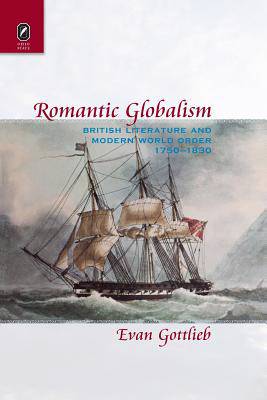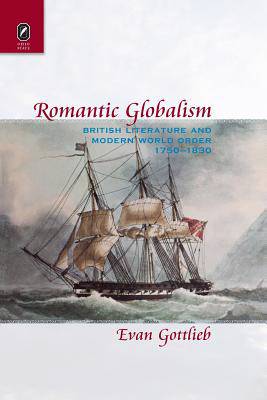
Vous voulez être sûr que vos cadeaux seront sous le sapin de Noël à temps? Nos magasins vous accueillent à bras ouverts. La plupart de nos magasins sont ouverts également les dimanches, vous pouvez vérifier les heures d'ouvertures sur notre site.
- Retrait gratuit dans votre magasin Club
- 7.000.000 titres dans notre catalogue
- Payer en toute sécurité
- Toujours un magasin près de chez vous
Vous voulez être sûr que vos cadeaux seront sous le sapin de Noël à temps? Nos magasins vous accueillent à bras ouverts. La plupart de nos magasins sont ouverts également les dimanches, vous pouvez vérifier les heures d'ouvertures sur notre site.
- Retrait gratuit dans votre magasin Club
- 7.000.0000 titres dans notre catalogue
- Payer en toute sécurité
- Toujours un magasin près de chez vous
Romantic Globalism
British Literature and Modern World Order, 1750-1830
Evan Gottlieb
Livre broché | Anglais
33,45 €
+ 66 points
Description
Romantic Globalism: British Literature and Modern World Order, 1750-1830 explores how British literature of the late eighteenth century and Romantic era both reflects and inflects the increasingly global world in which it was produced and consumed. Building on recent work in globalization studies, cosmopolitanism, and critical theory, Evan Gottlieb investigates the ways in which, following the economic and historiographical writings of the Scottish Enlightenment, a number of influential Romantic-era authors began representing, mediating, and even critiquing their experiences of globalization in poetry, fiction, and drama. Although modern media tend to represent globalization as an essentially contemporary phenomenon, many scholars now agree that its fundamental dynamics--especially its characteristic annulment of spatial and temporal differences--have been present for several centuries. Moreover, the last decades of the eighteenth century and the first of the nineteenth century saw the convergence of a number of world-changing socio-political developments in the Western world. Romantic Globalism is significant because it is the first extended scholarly study that brings together these lines of inquiry. In so doing, Romantic Globalism not only charts a new course of study for British Romanticism but also suggests how the Romantics' visions of globality might still be valuable to us today.
Spécifications
Parties prenantes
- Auteur(s) :
- Editeur:
Contenu
- Nombre de pages :
- 224
- Langue:
- Anglais
Caractéristiques
- EAN:
- 9780814252857
- Date de parution :
- 01-06-16
- Format:
- Livre broché
- Format numérique:
- Trade paperback (VS)
- Dimensions :
- 152 mm x 229 mm
- Poids :
- 335 g







